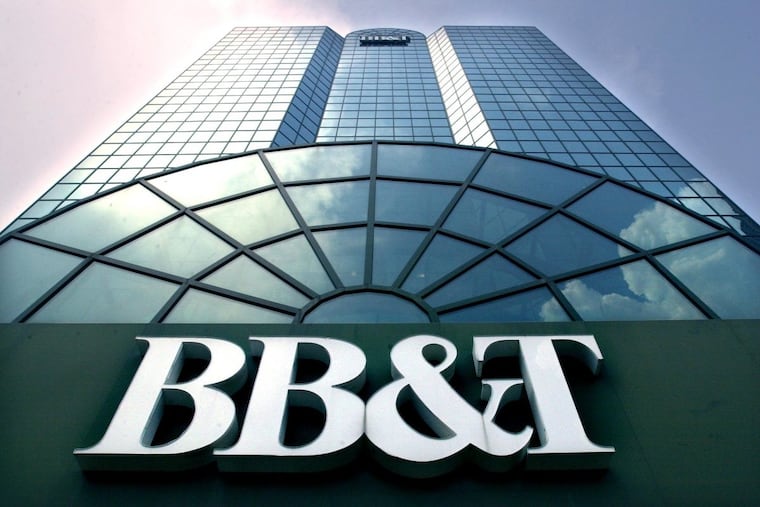Philly's newest bank, BB&T, plans for growth
While the largest bank in the region, Wells Fargo, continues to cut, other banks see opportunity.

In the latest sign that the homely bank branch is in trouble, Wells Fargo & Co. has cut a layer and a half of bosses from atop its branch network, the nation's largest.
The bank, which has the top market share in Philadelphia, has eliminated its retail-banking area managers — including Greg Redden, who had held the job in Philadelphia for the past four years — and reduced the number of local regions, combining Philadelphia with its northern suburbs, for example, while continuing to shut hundreds of offices a year.
Like other banks, Wells Fargo has struggled to keep profits growing from the brick-and-mortar centers it acquired in its multibillion-dollar mergers as more Americans do their banking online. Former chief executive John Stumpf was forced from office after the bank's practice of opening new accounts without customers' permission, to meet his aggressive branch growth targets, was exposed last year.
But not every bank is done with branches. To be sure, one of the nation's largest lenders, BB&T — the old Branch Banking and Trust Co., of Winston-Salem, N.C., newly arrived in the Philadelphia area with its recent purchases of Susquehanna and National Penn banks — has closed its share of redundant offices and plans to shut dozens more in a network that stretches from Allentown to Texas.
But "we will be opening a couple more branches in Philadelphia over the next three years," says chief executive Kelly King, who was in town Monday visiting newly-acquired employees and customers.
National Penn (lately based in Allentown) and Susquehanna (from Lancaster County) were largely suburban and small-city institutions. King sees the action has moved to big cities like Philadelphia, and he wants to make sure BB&T has a bigger base here than its four current Center City branches and five in Northeast Philadelphia.
While Wells Fargo and other big banks have in recent years rotated some of their local-market managers like traveling salespeople, BB&T is, at the moment, emphasizing its hometown team, headed by Scott R. Gamble, who traces his banking roots to small-business lenders Continental (now part of PNC), Prime (now part of Bank of America), and Susquehanna. Backed by BB&T's $200 billion-plus in assets (smaller than PNC, larger than Citizens), Gamble says he's glad to be able to go after the Philadelphia area's largest clients — hospitals, local governments, corporations, investors.
I asked King whether he still hopes last year's Republican election victories will speed up business. Clients "were very pessimistic prior to the [November] elections," he said. "They were driving trucks with 300,000 miles on 'em, and using 20-year-old computers.
"After the election, there was a huge increase in optimism. They have been making replacement investments — maintenance, repairs." Still, too many business owners "are not making expansion investments — people, equipment. That will require actual movement in Congress on taxes and [boosting] infrastructure spending, and the changing impact of regulation."
Are business' goals — tax reform, an infrastructure bill, cuts to environmental and employer regulation — still likely, given Washington's failure to deliver health-care insurance reform on schedule? "There is still a strong belief we will get changes done," King insists. "We are not competitive globally from a tax point of view. Mitch McConnell and Paul Ryan understand that. A lot of Democrats understand that.
"Health care is emotional. But taxes are rational," King says. So are bridges and highways: "We'll get infrastructure passed." He's also pushing for education reform — using technology, including electronic devices and education software, to teach youngsters the math and reading that employers require but that too many are not absorbing in schools.
King's own math shows that the big-bank mergers of 10 years ago are no longer economically feasible because nobody knows how long individual branches will remain profitable. But acquisitions still make sense in neighboring and "overlapping" markets, where you can close offices without losing too much business. King promises he'll keep offices open and visible: "That's psychological. Banks are where the money is. And if I have a problem, that's where I need to go and see the banker."